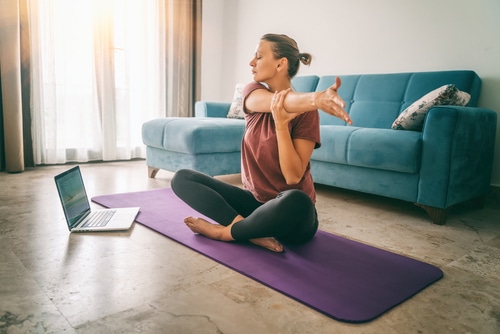As the new year is upon us, it is time to start setting our New Year’s health resolutions. While the new year is a great time to start fresh, it is also important to remember that health is a lifestyle, not a one-time goal.
This blog post will explore how to take healthy steps and motivate yourself to make the most of 2023. From joining a wellness program to setting realistic exercise goals and focusing on mental health and self-care, we will discuss the key areas that should be a part of your health resolution.
1. Join A Wellness Program
2023 is the year to change your life and prioritize your well-being. Joining a wellness program is a great way to be healthier in the upcoming year. Wellness programs can give you the structure and guidance you need to stay on track with your health goals and make real progress.
When you join a wellness program, you have access to various resources and tools to help you achieve your health goals. You can find programs offering personalized health plans, nutritional advice, and exercise plans tailored to your needs. By engaging with these programs, you can develop healthy habits and progress toward achieving your goals.
Wellness programs also give you access to like-minded people who can support and motivate you. This can help you stay motivated and accountable for your goals. Many programs offer additional resources such as support groups, educational seminars, and health coaching.
2. Start a Meditation Practice
Are you looking to start a new year with some healthy resolutions? Look no further than meditation. Meditation has been proven to help with various issues, from stress relief to better sleep. In this section, we will outline how you can start meditating and see its positive impact on your life.
According to Nancy Mitchell, RN at Assisted Living, “it is important to understand how distractions can hinder your meditation practice. By limiting the number of distractions you allow into your life, you will be able to focus on your practice more easily.”
There are many different types of distractions that you can avoid, such as technology screens and other noises. Once you have learned how to limit distractions, it is time to choose the type of meditation that best suits you.
There are many different types of meditation, but for this blog post, we will focus on sitting and walking meditation practices.
● Sitting meditation involves focusing on your breath while sitting comfortably with your spine straightened out.
● Walking meditation is similar but focuses on walking in a specific direction without stopping or changing your pace.
Once you have started meditating regularly, creating a dedicated space for yourself to practice is important. This could be anywhere from within the privacy of your home to an outdoor location if you’re lucky enough to live in an optimal environment for practicing meditation, such as fresh air and bright light exposure during the morning hours when cortisol levels are lowest.

3. Set Realistic Exercise Goals
Starting a new year is a time for reflection and planning. This is also a time when it’s important to make healthy resolutions for the year ahead. However, achieving healthy goals can be difficult – who has time to work out every day? That’s why starting with simple goals you can realistically achieve is important.
For example, if you want to lose weight, set a weekly exercise goal of 20 minutes or more. Choose activities you enjoy and make them challenging by varying your weekly routine. This will help to keep you motivated and engaged throughout the year.
Additionally, track your progress and celebrate each milestone achieved. This will help to keep you focused on your goals while also providing small rewards along the way (such as treats or compliments).
4. Focus on Mental Health & Self-Care
If you’re looking to make new year’s resolutions, focus on your mental health first. A healthy mind leads to a healthy body, and vice versa. Here are some tips on improving your mental health this year.
1. Understand the importance of good mental health habits.
2. Identify areas of self-care that need improvement.
3. Utilize small and achievable goals to build momentum.
4: Track your journey and development over time to see progress being made
5: Find support from friends and family during this time!
Reading has also been linked to improved mental health. When you read, you’re engaging your brain, which can help reduce stress and anxiety. Reading can also help to increase your sense of empathy, as you can understand different perspectives and emotions.
5. Eat for Nutrition & Balance Sleep
To start, ensure you include healthy and nutritional meals daily in your plan. This means incorporating plenty of fruits and vegetables into your meals as well as avoiding unhealthy fats and carbs.
Make sure to get enough protein too, since it’s an important nutrient for maintaining muscle mass and energy levels throughout the day. Once your dietary basics are down, it’s time to adjust things according to what works best for you.
6. Increase Hydration Levels Every Day
Drinking enough water is essential for staying healthy and energized throughout the year. Not only does proper hydration help to prevent sickness, but it can also help to boost your mood and improve your overall performance. By following these easy tips, you can ensure that you drink enough water daily.
First and foremost, it’s important to identify your individual hydration needs. Everyone is different, so figuring out how much water you need each day depends on your body composition, activity levels, and other factors.
However, a good rule of thumb is to drink eight cups of fluids daily–this includes liquid and solid food.
7. Eat For Nutrition, Not Emotion
First and foremost, it’s important to assess your current diet and understand its nutrient content. By knowing what foods are full of nutrients and which are low in calories, you can make better food choices that will help you stay on track. Adopting mindful eating practices will help you take the time to savor your meals instead of wolfing them down without thinking.
Monitoring health markers such as blood pressure and cholesterol can help you track your progress over time and determine whether or not any areas need improvement.
When it comes to emotional triggers, learning how to cope with them effectively is key. Sometimes we find it difficult to stick to our healthy eating habits when we’re faced with stressful situations.
8. Outdoor Activities
“When it comes to your health, outdoor activities are an important component that can’t be overlooked,” says Tory Jon, Founder of Camper FAQs. From running to biking to simply taking a stroll, outdoor activities provide numerous benefits to your health and well-being.
First and foremost, outdoor activities can help reduce stress levels and improve mental health. Being out in nature can help reduce stress hormones and increase endorphins, which can help improve mood and reduce anxiety.
Additionally, being out in the sun can also help to boost your energy levels and improve your overall mood.
The physical benefits of outdoor activities are just as impressive. Spending time outdoors can help to improve cardiovascular health and reduce the risk of chronic illnesses. It can also help to strengthen bones, muscles, and joints, increase flexibility, and even help to maintain a healthy weight.
It can also help to improve your sleep. Exposure to natural light can help regulate the body’s circadian rhythm, which can help promote quality rest. Additionally, physical activity can also help to reduce the effects of insomnia.
Finally, outdoor activities can help to improve your creativity and focus. Being in nature can help to restore attention and give your mind a much-needed break, which can help to improve overall productivity.
9. Clean And Declutter
In our busy lives, it can be easy to forget the importance of cleaning and decluttering our living spaces. We can get so caught up in our daily routines that our homes can quickly become cluttered and disorganized, leading to stress and a feeling of general unease.
Peyton Robinson, Head of Marketing & Professional Interior Designer of Foter explains that: “the truth is that cleaning and decluttering your living space can have a drastic effect on your health and well-being.”
● Studies have shown that living in a cluttered and disorganized home can lead to higher stress and anxiety levels. This can, in turn, cause physical problems such as headaches, digestive issues, and even fatigue. On the other hand, a clean and organized home can lead to a sense of calm and relaxation, resulting in improved physical health.
● Cleaning and decluttering can also help with mental health. A cluttered and disorganized home can cause mental fog, leading to poor concentration and focus. On the other hand, a clean and organized home can help to promote clear thinking and better decision-making. It can also improve mental clarity, leading to a more positive outlook and better self-confidence.
● Finally, let’s look at the emotional benefits of cleaning and decluttering. Studies have found that living in a tidy and organized home can lead to a greater sense of contentment and happiness. This is because a clean and organized home can help to reduce worries and negative thoughts, leading to improved emotional well-being.
Conclusion
It is clear that wellness is a holistic concept; it encompasses physical, mental, and emotional well-being. Taking care of oneself is essential for leading a fulfilling life, and it is important to prioritize self-care to achieve true wellness.
Start by joining a wellness program, building a meditation practice, setting realistic exercise goals, focusing on mental health and self-care, eating for nutrition, balancing sleep, and increasing hydration daily.
Book Your Wellness Retreat at TheLifeCo






